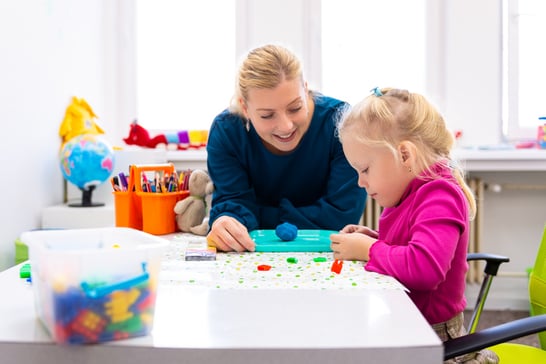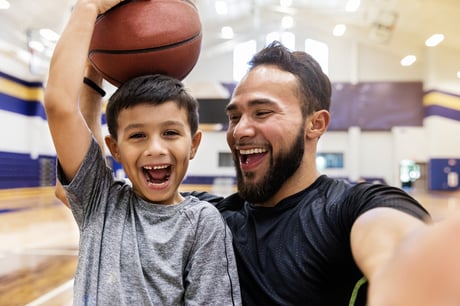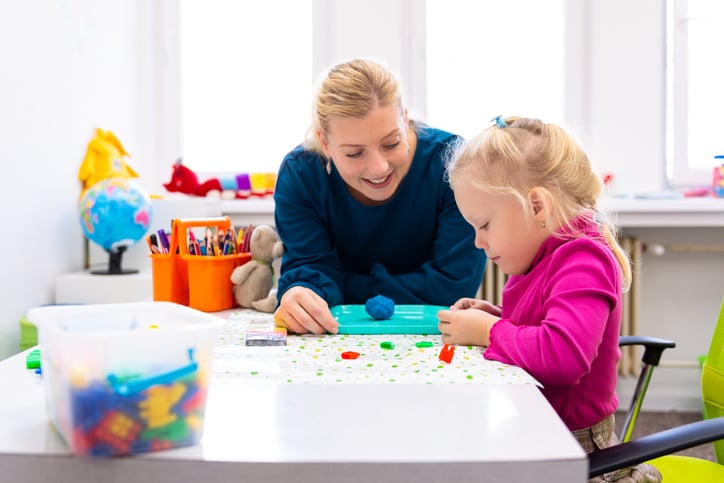Who's Who on the IEP Team?
Learn What Each Specialist Does in Order to Make the Most of Your Child’s IEP Team
When you show up to your child’s IEP meeting for the first time you may be wondering, “Who are all of these people?” You probably know the classroom teacher and the special education teacher, but there are so many other professionals with crazy acronyms who are also there. Here’s a look at some of the lesser-known key players that might be supporting your child with autism in the school setting.
-
School Psychologist
Especially if your child is under evaluation or a re-evaluation, you will likely end up talking to a school psychologist. The school psychologist helps make sure that the IEP team complies with meeting deadlines, compiles information, and helps coordinate the team members. For an evaluation, a school psychologist will typically conduct assessments to gain more information about the student’s current level and will compare results to previous school evaluations (if applicable).

-
Speech Language Pathologist (SLP)
Many autistic students have speech services. The SLP will help the student work on different skills related to speech like articulation, pragmatics, or social comprehension. In addition to the case manager or teacher, the SLP works specifically on verbal behavior development. If you’re looking for additional resources, websites, tricks, or tools to help support communication skills—you should certainly connect to this IEP team member.
-
Audiologist
Hearing issues can be a common concern for autistic students. An audiologist may be a member of the team if the student has been diagnosed with hearing loss, deafness, or auditory processing deficits. They train and support the team on the use of any hearing aids or specific accommodations related to hearing. They may also help the team to develop IEP goals and curriculum modifications necessary for the student to participate in the classroom. This may also be the person to contact you for those annual hearing screenings if your child already has a hearing impairment.
-
Occupational Therapist (OT)
Writing is an especially challenging skill for autistic students and your OT is the person that works very closely on those fine and gross motor skills. Fine motor skills are those tasks that involve using your fingers to accomplish something such as writing, buttoning, and stringing. Think of gross motor skills as involving the big parts of the body; this can include throwing, kicking, and climbing.
Additionally, this professional is often seen as the sensory support expert. It may surprise you, but there are more senses than the original five (sight, touch, taste, sound, and smell). When going through their information in the IEP, you may hear some of these terms which are related to sensory inputs in different parts of the body.
- Vestibular system: awareness of your body in space
- Proprioception: the body’s understanding of the relationship between muscles and joints such as applying appropriate force and pressure
- Interoception: awareness of inner body sensations such as hunger or thirst

-
Physical Therapist (PT)
A physical therapist is often mixed up with an occupational therapist because both of these roles involve improving the body’s performance. The major difference is that a PT is only involved in an IEP team if the student’s movement and ability to access the educational setting are greatly impaired due to their mobility.
A physical therapist may be working with a student on walking upstairs, accessing the playground equipment, or physically getting onto the toilet.
As a side note, this professional is not focused on actually toilet training, but they would work more on the student’s ability to get themselves to a bathroom and onto the toilet. Typically, many professionals work together to support toilet training goals, but the PT would only be involved if the student had physical difficulties.
-
Board Certified Behavior Analyst (BCBA) or other behavior specialist
Depending on the district, they may have a BCBA come to the IEP meeting or some other specialist who is supporting the student and team on behavioral support. A BCBA applies principles of applied behavioral analysis (ABA) to determine supports and interventions to help students develop school readiness skills and emotional regulation. If the student has behaviors of concern, they will help the team understand why the behavior is occurring and develop a plan for adults to follow to prevent and respond to those behaviors.
-
Music Therapist (MT)
For a music therapist to be a part of the IEP team, the student must show an increase in a specified area such as communication, behavioral, social, or academic skills when the tasks are performed with music. It’s more than “the student loves music,” but the student can make progress on their IEP goals with the use of music. So, the purpose of this professional won’t necessarily be to teach the student how to play guitar or some other instrument, but rather, they work with the student on existing IEP goals through the use of music.
-
Career Transition Specialist
Once your student is 14, you may start to see a new team member at the IEP table. What the career transition specialist role and involvement looks like will vary greatly depending on the types of needs that your student requires. For all students with IEPs, they administer assessments to determine their interests and strengths related to careers.
In the IEP document, the career transition specialist will discuss with you and your student what their goals are for post-graduate life, work, and living situations. From there, they will work with the available resources within the school to help ensure that they are taking classes and afforded opportunities to set themselves up to meet their goals.
The Career Transition Specialist works with students and staff regarding a range of transitional topics including adaptive daily skills, post-secondary planning, self-determination, work-based skills, resumes, and interviewing. These professionals will also help to facilitate tours of workplaces or post-secondary institutes. They will also supervise job coaches.
-
Honorable Mention: Job Coach and Paraprofessional
Now, you typically will never see a job coach or professional at an IEP meeting as classified staff members; however, they are worth an honorable mention as the very, super secret team member who deserves an honorable mention at the very least!
 Job coaches are supervised by the career transition specialist and receive training to be able to support the student on a job site. Generalizing skills from the school setting to out in a community setting can be a tall order for an autistic student and the job coaches are those boots on the ground that help provide the student with the support and interventions needed to be successful using their job skills in a real-life work setting.
Job coaches are supervised by the career transition specialist and receive training to be able to support the student on a job site. Generalizing skills from the school setting to out in a community setting can be a tall order for an autistic student and the job coaches are those boots on the ground that help provide the student with the support and interventions needed to be successful using their job skills in a real-life work setting.
Similarly, paraprofessionals are supervised by the special education teacher also known as the case manager. They also receive training on individualized supports needed to help the student be successful, but obviously, there is only one case manager so paraprofessionals will help provide support; specifically, if the student needs support in the general education setting. Paraprofessionals often help autistic students apply their social skills instruction while also meaningfully participating in academic concepts. Perhaps it goes without saying, but having so many inputs while navigating the social dynamics of a classroom can be very overwhelming for autistic students, so those paras are also well-versed in providing de-escalation strategies to help students.
Are there other lesser-known IEP team members that you’d like to shout out to? How have they or any of the professionals on this list helped to support your student?

Frankie Kietzman, Ed.S.
Frankie Kietzman is a Sales Development Associate for STAGES Learning with experience teaching as an elementary teacher, self-contained autism teacher for elementary and secondary students, autism specialist and coach for teachers dealing with challenging behaviors. Frankie’s passion for supporting children and adults with autism originates from growing up with her brother who is deaf and has autism. As one of her brother’s legal guardians, she continues to learn about post-graduate opportunities and outcomes for people with autism. Frankie has a Bachelor’s degree from Kansas State University in Elementary Education, a Master’s degree in high and low incidence disabilities from Pittsburg State University and in 2021, completed another Master’s degree in Advanced Leadership in Special Education from Pittsburg State University.




